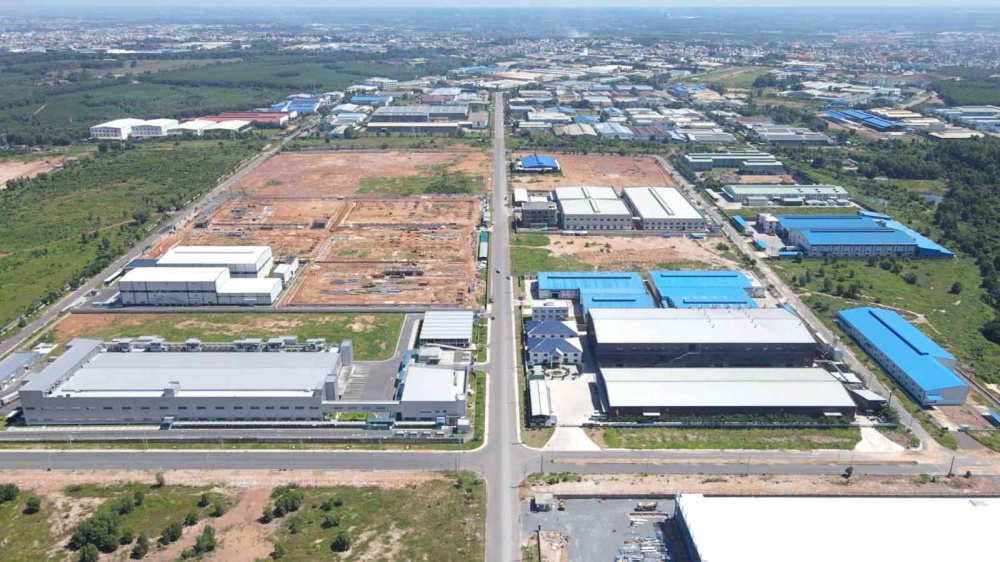SIP moves into defensive mode
Saigon VRG Investment Corporation (HOSE: SIP) faces mounting pressure amid escalating U.S.–China trade tensions.

In response to the increasingly volatile global environment, SIP has adopted a cautious outlook for 2025. The company projects consolidated revenue of over VND 5,657 billion and after-tax profit of nearly VND 833 billion, representing declines of 33% and 35%, respectively, compared to its 2024 performance.
The Golden Goose: Core Business Continues to Deliver
SIP’s revenue and profit continue to rely heavily on its core industrial park (IP) utilities business. In 2024, the company posted a record-high performance, with revenue reaching over VND 7,800 billion (up 17%) and net profit exceeding VND 1,278 billion (up 27.4%). A substantial portion of this revenue – over VND 6,547 billion – came from the provision of electricity and water utilities within its IPs, marking a 15% year-over-year increase. SIP outperformed its annual revenue target by 61%, underlining the strategic importance of this segment.
Currently, SIP operates and leases out four industrial parks in southern Vietnam. Among them, Phuoc Dong IP in Go Dau District, Tay Ninh Province, is the largest integrated complex with over 2,436 hectares. In Ho Chi Minh City, the Le Minh Xuan 3 IP spans 311 hectares, while the Dong Nam IP covers 342 hectares. Additionally, the Loc An – Binh Son IP in Dong Nai occupies nearly 498 hectares. All four parks are proving to be highly lucrative assets, generating stable cash flows for SIP.
By the end of 2024, SIP’s total assets rose by 19% year-on-year to nearly VND 25,026 billion. The company held around VND 5,300 billion in bank deposits, up 65%, accounting for 21% of total assets. Nevertheless, SIP continues to carry a substantial debt burden. As of Q1 2025, the company’s total liabilities stood at VND 20,185 billion.
Land Bank Advantage and Long-Term Development Strategy
SIP is currently the largest listed company in Vietnam in terms of industrial land available for lease, with more than 1,000 hectares primarily located in the South. Alongside its leasing business, SIP provides integrated utility services, including electricity, water, factory rental, and waste treatment, for its tenants.
In 2025, SIP plans to lease out 52 hectares of land, with Phuoc Dong and Loc An – Binh Son IPs expected to contribute the most. Projected land handovers for the year include 50 ha at Phuoc Dong, 20 ha at Loc An – Binh Son, and 5 ha each at Dong Nam and Le Minh Xuan 3.
In Q1 2025 alone, Phuoc Dong IP delivered 15.5 hectares to textile firms Hailide and Beauty, and signed a lease agreement for 50 ha with Global Hantex, highlighting SIP’s strong appeal to foreign investors, especially in textiles and garments.
Moreover, the Long Duc Phase 2 IP project in Dong Nai, with 294 hectares (69.5% owned by SIP), received investment approval from the Prime Minister in February 2025. This project is being developed on former rubber land, and compensation and land clearance are proceeding smoothly. The site is expected to be ready for lease by 2026, with an estimated annual leasable area of 10–20 hectares.
Beyond land leasing, SIP also benefits from government licenses to install power substations within IPs, adding significant long-term revenue. The company currently has more than VND 11,700 billion in unrecognized (deferred) revenue on its books.
U.S. Tariffs: A Growing Challenge
Despite these advantages, SIP is grappling with the increasing complexity of U.S. trade policy under the Trump administration, which has impacted land lease agreements. Although current U.S. tariffs are under a 90-day suspension pending negotiation, the uncertainty has already led to delays and paused orders from some U.S.-oriented businesses operating in SIP-managed parks.
Some tenants, having paid 50% of their lease upfront, are now seeking to return land. SIP has had to work closely with these businesses to provide reassurance and collaborative support.
The broader implication is clear: without successful trade negotiations between Vietnam and the U.S., SIP and many other IP developers could see a slowdown in export-linked industries. SIP must now prepare not only to shield its core operations but also to adjust its development strategy amid growing global economic volatility.
To adapt, SIP's long-term strategy will focus on investing in high value-added sectors and developing a more flexible business approach to cope with market uncertainty.
There is optimism, however. If Vietnam and the U.S. reach a trade agreement within the 90-day window, SIP would be well-positioned to benefit. This could lead to further development of its approved IPs and renewed momentum in foreign investment.








